- Home
- Raymond Benson
The Facts Of Death Page 13
The Facts Of Death Read online
Page 13
The chemical grenade produced an immense white cloud. The four soldiers were not hurt by the blast, but they were blinded by the smoke. There was something in it that irritated their eyes and made breathing extremely difficult. They fell to the ground and groped their way toward what they believed would be safety. One man heard the taxi’s engine roar into life as it sped away a half-minute after the explosion. When the smoke finally cleared three minutes after that, the men were still coughing and gasping for air. They didn’t notice that the number “5” had been spray-painted on the wall of the checkpoint building. Sitting on the ground below the number was a small alabaster statue of Athena, the Greek goddess of wisdom.
The soldiers made it to their feet, and one crawled into the guard post to call the authorities. He was able to dial the number and tell his superior officer what had just happened. He then became violently sick and was stricken with cramps.
When the police and more soldiers arrived at the checkpoint, two of the soldiers were dead and the other two were nearly so. In the half hour since the grenade exploded in front of them, the men experienced a number of symptoms that came on suddenly and escalated from one to the other without warning. The difficulty in breathing led to excessive nausea and vomiting, cramps, involuntary defecation, spasms, and finally reduction of the heart rate. They had been killed by the nerve agent sarin, a particularly nasty chemical that acted quickly and aggressively.
As for the Plymouth and the mysterious masked figure that made the attack, the car had been abandoned three blocks north of the checkpoint. The assassin had jumped into a 1988 Volkswagen and was now heading innocently toward the port city of Famagusta.
The Turkish Republic of Northern Cyprus uses two major ports on the northeastern part of the island. Kyrenia, directly north of Lefkosia, is mostly a passenger harbor, the point of entry for mainly Turkish tourists or immigrants. Famagusta, on the east coast of Cyprus, is the harbor for shipping and trade. Like Nicosia/Lefkosia, it is a walled city, and it has certainly seen better days. Probably the city with the longest and most colorful history on Cyprus, Famagusta has changed hands a number of times. Now the TRNC’s flag, which is similar to the Turkish red and white flag except that the colors are reversed, blew in the wind at the dock along Shakespeare Street.
Dominating the northeast shoreline are the docks themselves, an entrance into the city called the Sea Gate, and an impressive ancient citadel known as Othello’s Castle. Shakespeare supposedly based his famous play on the citadel and a legendary dark-complexioned Italian mercenary who fought for the Venetians and was called il Moro, “the Moor.”
The lone man standing in the dark on the roof of the castle could just see the long boardwalk projecting southeast. He could also see the small white Turkish guard post, the one crane in operation, and two ships that were docked at the port. One of the ships was loaded with food and supplies from Turkey. Looking through binoculars, he panned the edge of the dock and finally saw the camouflaged figure emerge from the shadows. Right on time.
The figure turned toward the castle and flashed a penlight three times. It was the signal for the man to get the escape route ready. He made an acknowledgment of one flash with his own penlight, then made his way down the dark stone steps to the first floor of the castle. He had paid admission to get inside the citadel during business hours and had found a place to hide until dark. Now all he had to do was use the long wooden ladder he knew would be in the maintenance shed, and climb over the wall of the castle to the street.
Meanwhile, on the dock, the figure in camouflage protective gear, gas mask, and hood slithered up to the lonely white guard post. Only two Turkish soldiers manned the booth at this time of night. The unloading of the supply ship would take place in the morning. Security was normally reliable and there wouldn’t have been a need to post extra guards around the ship. The soldiers had no reason to believe that the Famagusta dock was about to become the latest target of the most skillful trained assassin in the Mediterranean. The Number Killer was probably right to think there was no one in the world better at this job.
The murderer boldly walked up to the guard post and stood in the doorway. The two Turkish guards looked up in surprise at the frightening shape before them. For the brief moment the men were able to gaze upon their killer, all they could see was the gas mask and its likeness to an insect’s head.
The Number Killer shot both men with a Daewoo DH380, a double action semiautomatic pistol made in South Korea. The silencer muffled the sound of the .380 caliber bullets that slammed into the soldiers and knocked them back against the wall. They slumped into a heap on the floor, bleeding profusely.
The camouflaged figure moved quickly to the ship docked a few meters away. One lone sailor was on deck, smoking a cigarette. The assassin calmly walked to the end of the ramp and proceeded to climb aboard the ship. The Turkish sailor saw the bizarre creature appear in front of him and was too frightened to scream. The Daewoo let off another round, kicking the sailor over the rail and into the water.
Another sailor called from below in Turkish. “What’s going on?” he yelled. The Number Killer confidently opened the hatch and descended the steps into the bowels of the ship. It took two more bullets to make sure that no one was alive to witness the assassin’s next act.
He opened the cargo hold and stepped inside. The ship was full of much-needed food from the mainland. There were crates of vegetables, cartons of eggs, bags of potatoes and other types of produce. There was enough food to stock all the grocery markets in northern Cyprus for at least three days. If all went as planned, when the goods were unloaded and shipped to diverse parts of the TRNC they would be covered with an invisible and deadly germ.
The figure in the protective suit removed a backpack and set it on the floor. He opened it up quickly and removed a metal canister. He unscrewed the top to reveal four glass vials full of liquid attached to the inside of the canister. The Number Killer then removed a spray gun from the backpack. It was a type of everyday garden tool used for pesticides. The canister with the vials fitted perfectly onto the back of the spray gun.
The assassin stood up and began to spray the crates of vegetables. The heads of lettuce and potatoes were covered with the fine mist. The breads and eggs were blanketed by the tasteless, odorless chemical. After ten minutes, the Number Killer had efficiently emptied the spray gun, and the entire cargo room was covered with the already drying liquid. There was still one more task left to do. Reaching into the bag of tricks, the assassin pulled out the spray paint can and drew the number “6” on the wall of the cargo hold. He then carefully set a small alabaster statue of Hermes, the ancient Greek god of trade, commerce, and wealth, on the floor. He quickly packed up his equipment and left the ship the same way he had come in.
There was still no activity on the dock. No one had discovered the bodies of the two guards yet. The Number Killer walked calmly across the boardwalk to the Sea Gate. The rope he had left earlier was still there. He climbed up the wall and over the barbed wire. This time he pulled up the rope as he perched on top of the wall, straddling the barbed wire. Down below, on the other side of the wall, was a public utility truck. It was the kind used for highway building and maintenance, and the back was full of sand. The killer calmly jumped into it.
The man who had been on top of Othello’s castle was sitting in the driver’s seat of the truck. He heard the thump of the assassin landing in the sand. That was his cue, and he started the truck and headed northwest out of Famagusta on the main road, Cengiz Topel.
If it hadn’t been for the anonymous phone call to the Famagusta police one hour later, the food aboard the ship would have been sent out to feed over eighty thousand Turkish Cypriots. The voice on the other end of the line spoke English and sounded neither Greek nor Turkish. The message was that the food in the cargo ship at the dock must be burned. Under no circumstances should the hold be entered without protective clothing and gas masks, for a deadly biological agent had been distribu
ted inside. The call was dismissed at first as a hoax, but one Turkish Cypriot policeman decided it wouldn’t hurt to go take a look. When he found the dead soldiers in the guard post, he sounded the alarm.
By noon the next day, the authorities had determined that if the food had been shipped to its final destinations, within a week northern Cyprus would have been hit by a devastating anthrax plague.
The sun shone on Anavatos and produced an unseasonably warm day for November on Chios. There had been a couple of tourists from Italy early in the day, but they were gone by midafternoon. The Italians had no idea that the medieval fortress at the top of the cliff masked the modern headquarters complex of the Decada. They walked right over a trapdoor made of stone, completely unaware of the meeting going on below in the square meeting room.
The Monad was not pleased. Eight members of his elite group were present. The cushion usually occupied by Number Ten was vacant. The Monad had dispensed with many of the formalities of the meetings, and began after only five minutes of silence. He strummed the lyre and spoke.
“Welcome,” he said in the quiet voice that mesmerized his followers. “I am happy to report that Mission Number Five was entirely successful. Four Turkish soldiers in illegally occupied northern Cyprus were eliminated. Mission Number Six was also implemented quite successfully, and I must commend Number Two, the Duad, for bravery and two jobs well done. However, I am distressed to inform you all that Mission Number Six was not a total success. While Number Two completed the mission, it was not carried through to our ultimate goal of spreading anthrax over northern Cyprus. The deed was discovered by the authorities before the cargo ship was unloaded.”
The other members of the Decada looked concerned. Number Two was especially angry.
The Monad raised his hands to reassure them. “Do not trouble yourselves, my friends. I have the answer. I know what happened. The gods have been good to me and have revealed to me the source of betrayal in our organization. But before I have the traitor brought in for trial, I have other grave news. Number Ten will no longer be joining us. Dr. Anderson was arrested in the United States two days ago. I have not received official confirmation yet, but I believe that she is probably dead by now. I am sure that she would have followed our strictest policy and taken her own life rather than subject herself to interrogation. It is a shame.”
Number Two did her best to control her emotions. She looked over at Number Eight, who acknowledged her pain.
The Monad continued, “The Decada has cut its business ties with the militants in Texas. We don’t need them anymore. The One will become the Many through the actions of our own efforts from now on. Unfortunately, we have to revise our plans somewhat. Mission Number Seven must now be used to deal with a traitor to the organization.”
The Monad clapped his hands twice. A soldier in a dark green camouflage uniform entered, dragging a young man by the arm. The rest of the Decada didn’t know him by sight, but they knew who he was.
“Loyal members,” the Monad said, “I present to you Charles Hutchinson, an Englishman. He is, as his father was, an enemy of the Decada. He alerted the Cypriot authorities that the cargo ship at Famagusta had been infected. Do you deny this charge, Mr. Hutchinson?”
“You killed my father, you bastard,” Hutchinson spat out.
“Your father failed to provide us with some valuable information that we needed. Instead of supplying it to us, he attempted to go to British authorities and expose us before we had accomplished our first set of goals. He had to die.”
Charles Hutchinson suddenly realized what his fate was. He began to tremble with fear.
“Look,” he stammered, “I’m sorry … I was just upset about my father …”
“Spare us your pleading,” the Monad commanded. “Are you aware of what has happened to the Suppliers in Texas? And to our loyal Number Ten, Dr. Ashley Anderson?”
Hutchinson, now speechless with fear, shook his head quickly.
“They are no more. The laboratory was destroyed by Number Ten, as instructed. The names of the major personnel in the Suppliers’ organization were supplied to the FBI in America, along with incriminating evidence. They are being rounded up as we speak. The headquarters was discovered and raided. We will have to find a replacement for Number Ten. I will recruit one of our more loyal employees.”
The Monad stood and stepped over to Charles Hutchinson. He placed his hand at the base of the young man’s head and gripped him tightly.
“Decada!” the Monad said with force. “I present to you Charles Hutchinson, traitor and enemy to our principles. What say you, guilty or not guilty?”
“Guilty!” the eight followers cried.
The Monad turned to Hutchinson and said, “I do so love a brief trial. It is decided. You have become Limited. Now you must join the One. Perhaps when the One becomes the Many, you will be forgiven.”
The Monad nodded slightly to the guard, who pulled Hutchinson out of the room.
The medieval castle at the top of Anavatos was at the edge of a cliff wall that dropped virtually straight down a quarter-mile to a wooded, hilly landscape. It was a breathtaking sight when one stood at the small stone wall which served as some protection to visitors to the ruins.
The stone trapdoor opened and three guards forced Charles Hutchinson out. He was screaming and crying, but there was no one around to hear him. Even the elderly residents who lived at the base of the ruined city wouldn’t hear him. Only the few birds circling the foreboding precipice in front of him could hear his cries.
The guards led him to the edge of the cliff and offered him a blindfold. He was too shaken to realize what they were asking. The guards shrugged and put the blindfold away. Hutchinson knew he was going to die, but he didn’t know how. He figured they were about to take him off Anavatos and drive him somewhere remote.
When the push came, he was surprised.
Watching on a video monitor from inside the complex, the Monad nodded his head and said a prayer to the gods. He was pleased. They told him that he had been adequately avenged.
Number Two stood behind him, struggling to keep her feelings to herself. At least Number Ten had set their plan in motion before she died. It was now up to her and Number Eight to see it through to the end.
TWELVE
HIDDEN AGENDA?
BOND SPENT ANOTHER TWO AND A HALF DAYS IN TEXAS, THEN RETURNED TO London in time to receive the news of the Number Killer attacks in Cyprus. He stopped by the flat and quickly examined the neatly stacked pile of post and newspapers from the past several days. Bond took a couple of hours to freshen up, then drove the Bentley to the office in time for a debriefing. It was still rainy and cold.
The green light flickered above the door just as Bond walked into Moneypenny’s outer office.
“Looks like there’s no time for chitchat, James,” she said. The green light was a signal for Bond to come inside. He raised his eyebrows at Moneypenny and went on through.
M stood with her back to Bond, gazing out the large picture window that overlooked the Thames. He waited a moment before saying, “Good afternoon, ma’am.”
She turned around and gestured to the black chair in front of her desk. “Sit down, 007,” she said, then moved back to her desk and sat across from him. The lines on her face seemed to be more prominent. Bond thought she looked tired and pale.
“Are you all right, ma’am?” he asked.
“Yes, yes,” she sighed. “It’s been a difficult few days.”
“I can imagine.”
“I was called on to help Alfred’s solicitors with his estate. His former wives wanted nothing to do with him, although I daresay he’s probably left something tidy to them in his will. Now I know how celebrities feel when their personal lives are displayed in public. It hasn’t reached tabloid stage, but my name was mentioned in the Times obituary. I would like to go away to the country for a month or so.”
“Perhaps you should,” Bond said.
“That would be cowa
rdly. Forget it. I was just speaking with Manville Duncan. He returned from the Middle East quite distraught. Manville is almost as upset about Alfred’s death as I am. He’s not cut out for Alfred’s job, but he’ll do fine as a temporary replacement, I suppose. You’ve heard about what happened in Cyprus?”
“Yes, I’ve read the briefing.”
“Two more attacks. One in Nicosia and one in Famagusta. Both directed against the Turkish side. More numbers. More Greek god statuettes. It was a blessing that someone called the Turkish Cypriot authorities and warned them of the poisoned food. Someone is on our side, at least.”
“It makes no sense,” Bond said. “Why attack our British bases, then go and strike against the Turks? It’s not as if we’re on Cyprus to protect the Turkish presence. If anything, we disapprove of their occupation as much as the rest of the Western world.”
“Quite so,” M said. ‘Turkey is the only country to sanction their government in northern Cyprus. We do not recognize the TRNC as a true republic, it’s just easier to say than ‘illegally occupied northern Cyprus.’ I’m afraid the world has tolerated the occupation far too long, mainly because, in many ways, the Turks were right to intervene. According to them, the Greek Cypriots did unspeakable things to the Turkish Cypriots in the 1960s before the Greek military coup. Turkey was supposedly protecting her people. Mind you, I’m not defending the Turks. They’ve committed horrible atrocities on Cyprus. But never mind that. Tell me about the Suppliers.”
“We won’t have to worry about the Suppliers anymore,” he said. “Their organization has been completely dismantled. I stayed around for two days assisting with the investigation. They raided the homes of all suspected Suppliers members and made a number of arrests. The main headquarters and storehouse for weapons was a barn in Bastrop, a small town near Austin. The amount of chemical weaponry they found was simply staggering. It is now believed that the Suppliers were one of the largest and most powerful distribution organizations in the world. The FBI found evidence that sales were made to over fifty clients worldwide.”

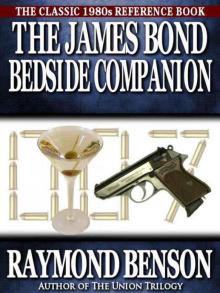 The James Bond Bedside Companion
The James Bond Bedside Companion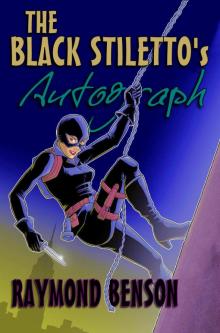 The Black Stiletto's Autograph
The Black Stiletto's Autograph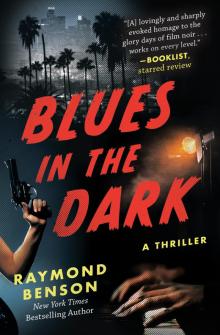 Blues in the Dark
Blues in the Dark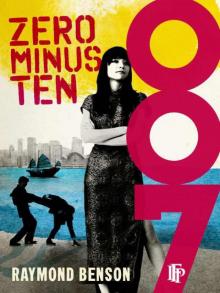 Zero Minus Ten
Zero Minus Ten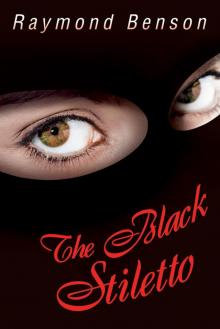 The Black Stiletto
The Black Stiletto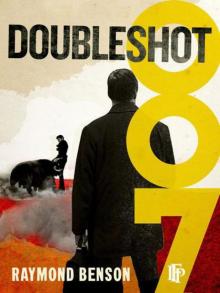 Doubleshot
Doubleshot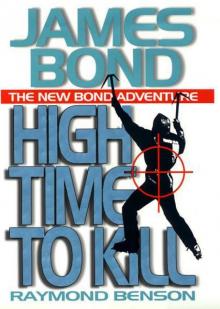 High Time To Kill rbb-3
High Time To Kill rbb-3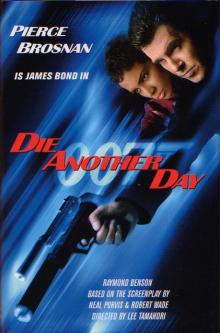 Bond Movies 07 - Die Another Day
Bond Movies 07 - Die Another Day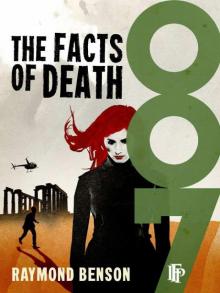 The Facts Of Death
The Facts Of Death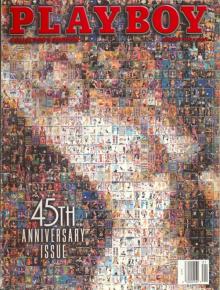 Midsummer Night's Doom
Midsummer Night's Doom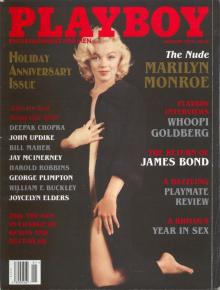 Blast from the Past
Blast from the Past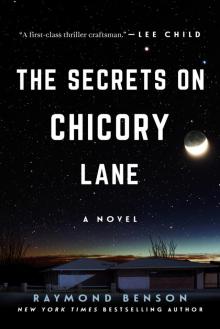 The Secrets on Chicory Lane
The Secrets on Chicory Lane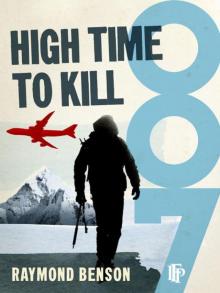 High Time To Kill
High Time To Kill The Black Stiletto: Black & White
The Black Stiletto: Black & White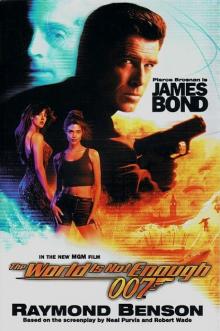 The World Is Not Enough jb-1
The World Is Not Enough jb-1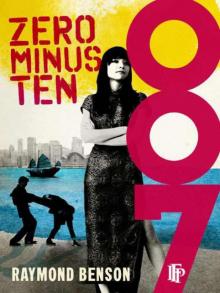 Zero Minus Ten rbb-1
Zero Minus Ten rbb-1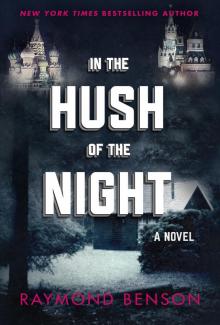 In the Hush of the Night
In the Hush of the Night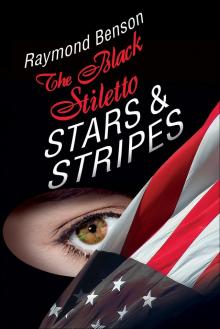 The Black Stiletto: Stars & Stripes
The Black Stiletto: Stars & Stripes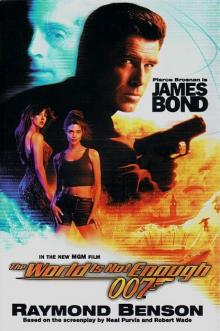 Bond Movies 06 - The World Is Not Enough
Bond Movies 06 - The World Is Not Enough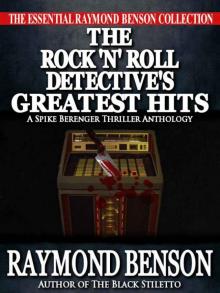 The Rock 'n Roll Detective's Greatest Hits - A Spike Berenger Anthology
The Rock 'n Roll Detective's Greatest Hits - A Spike Berenger Anthology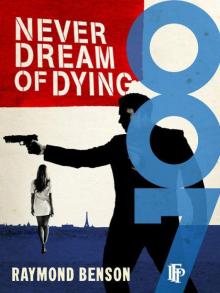 Never Dream Of Dying
Never Dream Of Dying